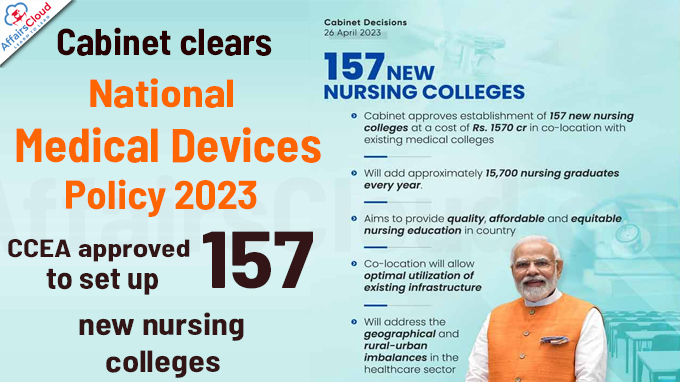
On 26th April 2023, The Union Cabinet chaired by Prime Minister (PM) Narendra Modi approved the National Medical Devices Policy, 2023, which is expected to help the Medical Devices sector expand to USD 50 billion(~Rs 4 lakh crore) by 2030.
- In 2020, the market size of the medical devices sector in India is estimated to be USD 11 billion (~Rs 90,000 crore) and its share in the global medical device market is estimated to be 1.5%.
About the National Medical Devices Policy 2023:
Vision: The policy envisions India’s accelerated growth path with a patient-centric approach and emerging as the global leader in the manufacturing and innovation of medical devices by achieving 10-12% share in the expanding global market over the next 25 years.
Mission: The policy provides a roadmap for the growth in the sector to achieve the following missions: Access & Universality, Affordability, Quality, Patient Centred & Quality Care, Preventive & Promotive Health, Security, Research and Innovation and Skilled manpower.
Strategies to Promote the Sector:
The policy will facilitate and guide the sector through a set of strategies that will cover six broad areas viz. regulatory streamlining, enabling infrastructure, facilitating R&D (Research and Development) and innovation, attracting investments, human resources development and brand positioning & awareness creation.
Reason behind this Policy:
Currently about 75-80% of medical devices are imported in India and with this scheme the government will enhance India’s manufacturing capacity. It will also cater to the growing demand for affordable quality medical devices.
Key Points:
i.Government of India has already initiated implementation of a PLI (Production Linked Incentive) scheme for medical devices, and also support for setting up of four medical devices manufacturing parks in the states of Himachal Pradesh, Madhya Pradesh, Tamil Nadu and Uttar Pradesh.
ii.Under the PLI scheme for Medical Devices, till now, a total of 26 projects have been approved, with a committed investment of Rs 1,206 crore and out of this, so far, an investment of Rs 714 crore has been achieved.
Cabinet approved to set up 157 nursing colleges
The Cabinet Committee on Economic Affairs (CCEA) approved the establishment of 157 new nursing colleges in co-location with existing medical colleges established since 2014. The outlay for the same will be Rs 1,570 crore.
- Uttar Pradesh (UP) will have the maximum number of colleges (27), while Rajasthan will have 23 and Madhya Pradesh, 14.
Key Points:
i.The move will add approximately 15,700 nursing graduates every year and will further ensure quality, affordable and equitable nursing education in India.
ii.The decision will remove the geographical and rural-urban imbalance in terms of nursing colleges as 40% of the existing colleges are in southern India.
iii.This is also being done as a part of the national mandate for Universal Health Care (UHC) and will help in attainment of Sustainable Development Goals (SDG).
iv.National Skill Development Corporation (NSDC) will collaborates with leading International & National agencies for skill development and placement of qualified nurses for overseas positions.
v.The Government plans to complete the project within next two years
- The Empowered Committee headed by the Union Health Secretary in the Centre and Principal Secretary, Health/Medical Education in the States will monitor the progress of the work.
Recent Related News:
i.Union Minister of State (MoS) Rajeev Chandrasekhar, Ministry of Electronics & Information Technology (MeitY) announced approval for the establishment of the Rs. 180 crore Electronics Manufacturing Cluster (EMC) in Dharwad District, Karnataka, which is estimated to create over 18,000 jobs.
ii.The Minimum Support Price (MSP) for Raw Jute for the 2023–2024 season has been approved by CCEA. During the 2023–24 season, the MSP for Raw Jute (TDN3 equivalent to TD5 grade) has been fixed at Rs. 5050 per quintal. It was Rs. 4,750 per quintal for 2022-23 season.




